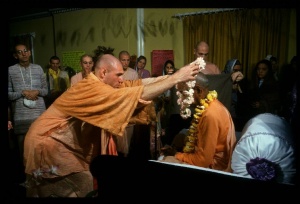SB 7.3.2: Difference between revisions
m (1 revision(s)) |
(Vanibot #0054 edit - transform synonyms into clickable links, which search similar occurrences) |
||
| (One intermediate revision by one other user not shown) | |||
| Line 1: | Line 1: | ||
{{info | {{info | ||
|speaker= | |speaker=Nārada Muni | ||
|listener= | |listener=King Yudhiṣṭhira | ||
}} | }} | ||
[[Category:Srimad-Bhagavatam - Canto 07 Chapter 03|s02 ]] | |||
[[Category:Bhagavatam Verses Spoken by Narada Muni - Vanisource|070302]] | |||
<div style="float:left">'''[[Srimad-Bhagavatam]] - [[SB 7|Seventh Canto]] - [[SB 7.3: Hiranyakasipu's Plan to Become Immortal|Chapter 3: Hiraṇyakaśipu's Plan to Become Immortal]]'''</div> | |||
<div style="float:right">[[File:Go-previous.png|link=SB 7.3.1]] '''[[SB 7.3.1]] - [[SB 7.3.3]]''' [[File:Go-next.png|link=SB 7.3.3]]</div> | |||
{{RandomImage}} | |||
==== TEXT 2 ==== | ==== TEXT 2 ==== | ||
<div | <div class="verse"> | ||
sa tepe mandara-droṇyāṁ | :sa tepe mandara-droṇyāṁ | ||
tapaḥ parama-dāruṇam | :tapaḥ parama-dāruṇam | ||
ūrdhva-bāhur nabho-dṛṣṭiḥ | :ūrdhva-bāhur nabho-dṛṣṭiḥ | ||
pādāṅguṣṭhāśritāvaniḥ | :pādāṅguṣṭhāśritāvaniḥ | ||
</div> | </div> | ||
| Line 17: | Line 22: | ||
==== SYNONYMS ==== | ==== SYNONYMS ==== | ||
<div | <div class="synonyms"> | ||
''[//vanipedia.org/wiki/Special:VaniSearch?s=saḥ&tab=syno_o&ds=1 saḥ]'' — he (Hiraṇyakaśipu); ''[//vanipedia.org/wiki/Special:VaniSearch?s=tepe&tab=syno_o&ds=1 tepe]'' — performed; ''[//vanipedia.org/wiki/Special:VaniSearch?s=mandara&tab=syno_o&ds=1 mandara]-[//vanipedia.org/wiki/Special:VaniSearch?s=droṇyām&tab=syno_o&ds=1 droṇyām]'' — in a valley of Mandara Hill; ''[//vanipedia.org/wiki/Special:VaniSearch?s=tapaḥ&tab=syno_o&ds=1 tapaḥ]'' — austerity; ''[//vanipedia.org/wiki/Special:VaniSearch?s=parama&tab=syno_o&ds=1 parama]'' — most; ''[//vanipedia.org/wiki/Special:VaniSearch?s=dāruṇam&tab=syno_o&ds=1 dāruṇam]'' — difficult; ''[//vanipedia.org/wiki/Special:VaniSearch?s=ūrdhva&tab=syno_o&ds=1 ūrdhva]'' — raising; ''[//vanipedia.org/wiki/Special:VaniSearch?s=bāhuḥ&tab=syno_o&ds=1 bāhuḥ]'' — arms; ''[//vanipedia.org/wiki/Special:VaniSearch?s=nabhaḥ&tab=syno_o&ds=1 nabhaḥ]'' — toward the sky; ''[//vanipedia.org/wiki/Special:VaniSearch?s=dṛṣṭiḥ&tab=syno_o&ds=1 dṛṣṭiḥ]'' — his vision; ''[//vanipedia.org/wiki/Special:VaniSearch?s=pāda&tab=syno_o&ds=1 pāda]-[//vanipedia.org/wiki/Special:VaniSearch?s=aṅguṣṭha&tab=syno_o&ds=1 aṅguṣṭha]'' — with the big toes of his feet; ''[//vanipedia.org/wiki/Special:VaniSearch?s=āśrita&tab=syno_o&ds=1 āśrita]'' — resting on; ''[//vanipedia.org/wiki/Special:VaniSearch?s=avaniḥ&tab=syno_o&ds=1 avaniḥ]'' — the ground. | |||
</div> | </div> | ||
| Line 24: | Line 29: | ||
==== TRANSLATION ==== | ==== TRANSLATION ==== | ||
<div | <div class="translation"> | ||
In the valley of Mandara Hill, Hiraṇyakaśipu began performing his austerities by standing with his toes on the ground, keeping his arms upward and looking toward the sky. This position was extremely difficult, but he accepted it as a means to attain perfection. | In the valley of Mandara Hill, Hiraṇyakaśipu began performing his austerities by standing with his toes on the ground, keeping his arms upward and looking toward the sky. This position was extremely difficult, but he accepted it as a means to attain perfection. | ||
</div> | </div> | ||
__NOTOC__ | |||
<div style="float:right; clear:both;">[[File:Go-previous.png|link=SB 7.3.1]] '''[[SB 7.3.1]] - [[SB 7.3.3]]''' [[File:Go-next.png|link=SB 7.3.3]]</div> | |||
__NOTOC__ | |||
__NOEDITSECTION__ | |||
Latest revision as of 23:00, 18 February 2024

His Divine Grace
A.C. Bhaktivedanta Swami Prabhupada
A.C. Bhaktivedanta Swami Prabhupada
TEXT 2
- sa tepe mandara-droṇyāṁ
- tapaḥ parama-dāruṇam
- ūrdhva-bāhur nabho-dṛṣṭiḥ
- pādāṅguṣṭhāśritāvaniḥ
SYNONYMS
saḥ — he (Hiraṇyakaśipu); tepe — performed; mandara-droṇyām — in a valley of Mandara Hill; tapaḥ — austerity; parama — most; dāruṇam — difficult; ūrdhva — raising; bāhuḥ — arms; nabhaḥ — toward the sky; dṛṣṭiḥ — his vision; pāda-aṅguṣṭha — with the big toes of his feet; āśrita — resting on; avaniḥ — the ground.
TRANSLATION
In the valley of Mandara Hill, Hiraṇyakaśipu began performing his austerities by standing with his toes on the ground, keeping his arms upward and looking toward the sky. This position was extremely difficult, but he accepted it as a means to attain perfection.